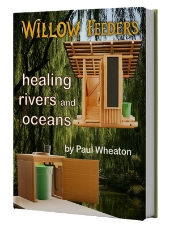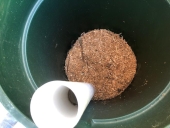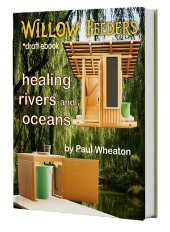
 11
11




 9
9











 8
8





 8
8




How Permies works: https://permies.com/wiki/34193/permies-works-links-threads
My projects on Skye: The tree field, Growing and landracing, perennial polycultures, "Don't dream it - be it! "
 7
7




paul wheaton wrote:Composting toilets are illegal in many counties and states. For good reason.
The designs are solid. It is a few sloppy implementations that are the problem.
To solve problems we need a stronger solution. A much stronger solution. Something so good that it is better than any other other solutions. Clearly better and difficult to botch.
"The genius of American farm experts is very well demonstrated here: they can take a solution and divide it neatly into two problems." -Wendell Berry
 10
10




paul wheaton wrote:The willow feeder works hard to NOT compost. We want to keep that organic matter. Once the pathogens are gone, we want that material to build massive ornamental gardens - starting with the amazingly useful willow tree.
https://www.kickstarter.com/projects/paulwheaton/willow-feeders?ref=4sgel6
Lif Strand
New Mexico USA
 15
15




Lif Strand wrote:We know what composting is and those who are observant can see that over time the matter in the compost pile "disappears" - if left alone for long enough, the organic matter breaks down and the gasses from decomposition go into the atmosphere.
What is the word that describes the willow feeder process?
Lif Strand wrote:Is it strictly a pathogen killer process through drying and if so, does the poop still look like poop after two years)?
Lif Strand wrote:What happens when you put the product from the willow feeder process next to a willow tree, where it gets watered - doesn't it essentially begin to decompose and become compost then?
Perfect The Dwelling Land!
 6
6




Samantha Lewis wrote: Some compost toilets are using the heat of the composting process to kill these pathogens. They use a higher nitrogen to carbon ratio to achieve this heat. More gasses and smells are released from a hot compost pile than in a cool moldering system.
"The genius of American farm experts is very well demonstrated here: they can take a solution and divide it neatly into two problems." -Wendell Berry
 7
7




Lif Strand
New Mexico USA
 8
8




 11
11




 7
7




 11
11




Certified Veganic grower in the high desert, on basalt.
 8
8




R Peter wrote:A toilet that uses worms is not a composting toilet because it doesn’t compost. It’s a vermiculture toilet.
A toilet that uses black soldier fly larvae is also not a composting toilet for the same reason, but I don’t know the name.
Composting toilets aren’t necessarily illegal, they’re just regulated and controlled - for the good reason that if one person can’t manage a composting toilet it impacts other people’s safety. Septic systems aren’t illegal, but if there’s a sewer pipe outside you can’t use one - you have to connect.
I’m unclear of the difference to a composting toilet system. Looking at the design, you collect poo and carbon rich material in a large bin and leave it to compost in the bin -aided by an aeration pipe- for 2 years. The moderate meaophillic temperatures from aerobic decomposition over 2 years kill pathogens. - so far this is a composting toilet.
You then put the compost on a willow tree.
I’m with you on trying to improve sanitation but I’m unclear of the difference to a composting toilet system. What am I missing?
 9
9




 9
9




 10
10





 16
16




Ask me about food.
How Permies.com Works (lots of useful links)

 6
6




 2
2




J Katrak wrote:
I have both worms and BSF in my outdoor compost bin. I think it's just semantics(?) as to who is doing the composting
...
If it composts in the willow feeder you're not feeding willows but feeding the atmosphere. At least that is my understanding.
 4
4




R Peter wrote:
J Katrak wrote:
I have both worms and BSF in my outdoor compost bin. I think it's just semantics(?) as to who is doing the composting
...
If it composts in the willow feeder you're not feeding willows but feeding the atmosphere. At least that is my understanding.
Digestion is not composting so worm castings are not compost. Worm castings are a great as a soil amendment, but they're not compost. Apples are fruit and oranges are fruit, but apples are not oranges.
Trees and Plants push fixed carbon from the atmosphere into the ground to Mycorrhizal fungi in exchange for nutrients. So why try to keep as much carbon as possible when it's the nutrients they want?
https://www.sciencedirect.com/science/article/pii/S0960982217307790#:~:text=Summary,the%20plant%20and%20the%20fungus.
Ascaris eggs are the ultimate survivor and can last upto 10 years outside a host:
https://www.cdc.gov/sth/about/about-ascaris-in-pigs.html#:~:text=Ascaris%20suum%20eggs%20from%20pigs,Ascaris%20suum%20in%20your%20pigs.
It's the temperatures and harsh environment of Composting that kills them - wood ash from a fire can also help by raising the PH.
Could wood ash may be a useful addition to the willow feeder mix to help kill this pathogen?
Testing for Ascaris egg destruction is expensive (especially if you don't have them to start with) - a proxy that has been proposed is tomato seeds. - If you have tomato seeds growing in your compost / willow feeder bin, the conditions have probably not been sufficient to kill an ascaris egg.
-R
 4
4




 3
3




J Katrak wrote:It's hot and humid in the summer.
"The genius of American farm experts is very well demonstrated here: they can take a solution and divide it neatly into two problems." -Wendell Berry








Ra Kenworth wrote:Stupid question here but how much do we have to raise?





| I agree. Here's the link: http://stoves2.com |





